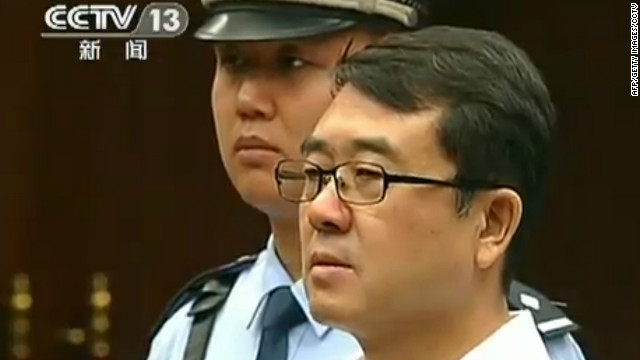
- Wang Lijun jailed for 15 years on charges including defection and bribe-taking
- Former Chinese police chief tried to defect to the U.S. in February
- Court documents reveal he told disgraced politician Bo Xilai about accusations against his wife
- Gu Kailai serving a suspended death sentence for murdering British businessman
Hong Kong (CNN) -- The former Chinese police chief who attempted to defect to the U.S. triggering one of China's biggest political scandals has been jailed for 15 years.
Wang Lijun, who was tried last week, was found guilty by the Chengdu City Intermediate People's Court of bending the law for selfish ends, defection, abuse of power and bribe-taking, state-run Xinhua news agency said Monday.
The 52 year old could have faced execution as bribe-taking carries the death penalty in China, depending on the amount involved and the seriousness of the case. Wang was accused in court of accepting bribes and property worth around 3.05 million yuan (around U.S.$480,00) for personal favors.
Read more: Wang Lijun: the cop at the heart of Bo scandal
Until he sought refuge in the consulate back in February, he had served as the right-hand man of disgraced Chongqing Party chief Bo Xilai, who was stripped of his titles in April due to an unspecified "serious breach of party discipline." Bo has not been in public since.
Wang didn't contest the charges, according to Xinhua, which published full details of the case against him -- including the first suggestion that Bo knew as early as January that his wife, Gu Kailai, was suspected of murder.
Read more: China's Bo Xilai 'implicated' in murder
After a one-day trial in August, Gu was found guilty of poisoning British businessman Neil Heywood in a hotel room in Chongqing last November. During her trial, she admitted pouring poison into his mouth, provided by a family aide who was also convicted of the crime.
According to Xinhua, prosecutors said Wang knew "perfectly well" that Gu was suspected of murder, but deliberately covered up for her so she would not be held legally responsible for Heywood's death.
Read more: Bo looms large over Party leadership
However, Wang apparently abandoned his efforts to conceal her crime when relations between the two became strained.
Wang said in his confession that Gu "turned hostile toward me, taking a different attitude from before when contacting me. She was not so warm as before and began to guard herself against me," Xinhua said. She was worried about her crime being exposed, and he was "not pleased" that Gu had told an increasing number of people about the incident.
Read more: Gu Kailai, the woman who had it all
Then in late January, Wang told "the then leading official of the Communist Party of China (CPC) Chongqing Committee" -- the position Bo held -- that Gu was "highly suspected" of having murdered Heywood, Xinhua said.
A witness, Guo Weiguo, testified that the official "angrily rebuked" Wang, before slapping him in the face. "The conflict was made public after Wang Lijun was slapped," Guo said.
After Wang's run-in with Bo, he instructed his staff to "rearrange" the case file on Heywood's file. Shortly after, he was demoted and three members working closely with Wang were put under "illegal investigation." "Wang felt he was in danger, giving rise to his idea to defect," Xinhua said.
On February 6, Wang entered the U.S. consulate in Chengdu, where he claimed his life was in danger and asked officials to fill out an application for political asylum. The next day however he was persuaded to leave the consulate and was taken into custody by Chinese officials.
In his final statement to the court, Wang was reported to have apologized for his crimes, saying, "I hope the serious impacts (caused by my acts) both at home and abroad would be eliminated through the trial. Meanwhile, I hope the trial will issue a warning to society and let more people draw lessons from me.
"For the Party organizations, people and relatives that have cared for me, I want to say here, sincerely, 'I'm very, very sorry, I've let you down,'" Wang added.
At the close of the trial, Wang's defense team pleaded for leniency in sentencing on the defection charge on the grounds that Wang left the U.S. consulate of his own volition. Prosecutors said he had provided key evidence to help authorities secure Gu's conviction for murder and on that basis his crime of bending the law for personal gain "could be lighter."
Wang's decision to seek refuge in the U.S. consulate brought the case into public view and led to Bo's high-profile demise.
Until the case was exposed, Bo was considered a top contender for the Politburo Standing Committee, the team of nine politicians who effectively rule China. China's Communist Party is expected to meet at its 18th National Congress next month to announce who'll occupy the top positions.
Bo, 63, was a charismatic, albeit controversial politician, who launched a "smashing black, singing red" campaign in Chongqing that promoted Communist ideology and zealously cracked down on organized crime.
His economic programs, which included millions spent on social welfare, made him a popular leader in Chongqing. But analysts say his populist policies and high-profile personal style were seen as a challenge to the more economically liberal and reform-oriented faction that dominated the current party leadership.
Bo and Wang were known to have worked closely on Bo's signature crime-fighting program in 2009. In just 10 months, Chongqing police arrested almost 5,000 people and executed more than a dozen.
No comments:
Post a Comment